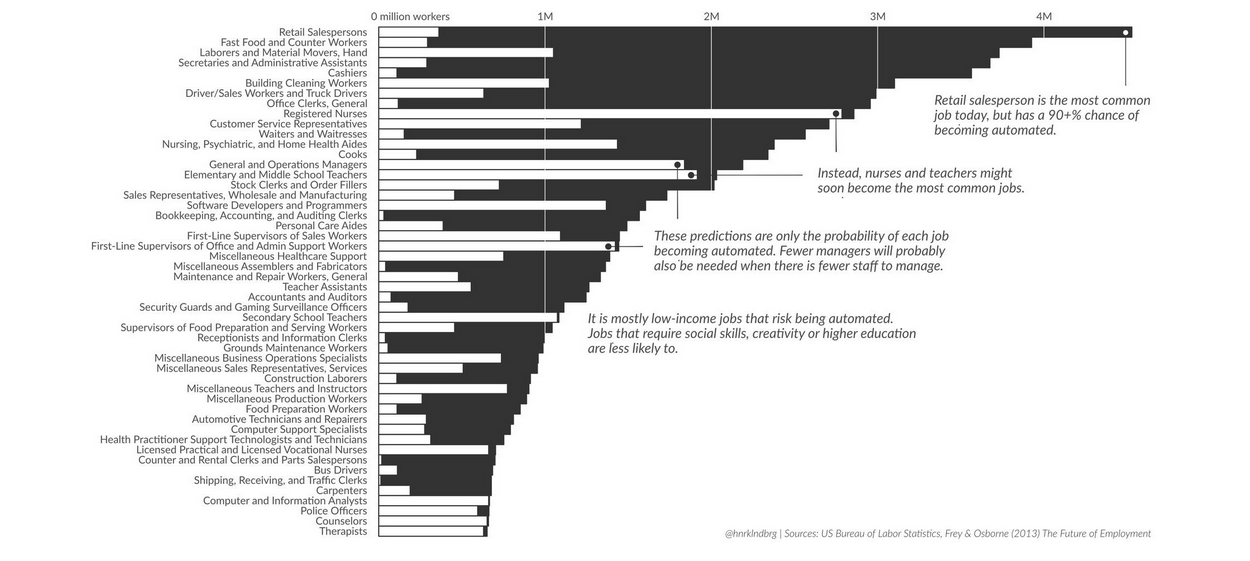Automation: Your Job Is About To Be Eliminated

It is becoming common knowledge that a number of lower-skilled jobs will disappear in the coming 5-10 years, due to the human element being replaced by autonomous machines.
“And while you probably think your job is further out on the timeline, or if you think your job requires a higher, special element of skill and mental acuity that just cannot be automated, you are probably very mistaken. In fact, there are few (if any) jobs in which a machine would be inferior to a person. And this is not as far out in the future as you may think,” says Stephen McBride of The Passing Parade.
“Just imagine, how Truck Drivers would have reacted if ten years ago, you told them that they would be at risk of being replaced by a machine? And this isn’t some far-off vision of the future… it is happening now:
The 227,000 jobs added to the payroll in January marked the 76th straight month of expansion. The headline number is impressive. But if you dig a little deeper, you’ll find the majority of positions created since 2010 have been temporary. Around 20–50% of employees at the likes of Google and Walmart now fall into this category. With the explosion of contract workers, “workforce solution” firms now generate an estimated $1 trillion in revenue every year.”
The new mantra of many of today’s biggest employers is:
“Can I automate it? If not, can I outsource it? If not, can I give it to an independent contractor?” Hiring an employee is the last resort.
Infact if you take a closer look over the past four decades, millions of jobs have been lost to automation. The manufacturing sector is a prime example. While productivity has increased, employment has fallen.
We can see this trend when comparing companies across time. The most valuable US firm in 1964 was AT&T. Then, it was worth $267 billion (in 2016 dollars) and employed 758,611 people. Today, Google is worth $370 billion and has only 55,000 employees.
Many workers have already been replaced by machines, but the number is only set to rise.
A 2013 study from the University of Oxford concluded that 47% of jobs in the US will likely be automated over the next two decades. And a 2015 report by McKinsey found that the majority of tasks performed in sectors like manufacturing and food service can be automated with currently demonstrable technology.
Also, in 2013, the Department of Labor predicted 65% of school children will be employed in jobs that don’t yet exist. Therefore, many of the skills they are learning today will likely be obsolete in the near future.
In the vastly different employment landscape of the future, the worry is that low income workers will have fewer opportunities available to them as technology comes into play.
The good news? Historically this has not been true. As an example, nearly 500 years ago, Queen Elizabeth I had a similar fear when she denied a patent for an automated knitting machine. The thought was that the machine would kill jobs, though eventually factories and companies adopted similar technologies anyways. With the lower prices, higher demand for knitted goods, and more capital for investment, jobs for factory weavers actually quadrupled in the coming years.
As we’ve seen over time, while machines destroy jobs, they also often create new ones.
Congratulations @monetarywatch! You have completed some achievement on Steemit and have been rewarded with new badge(s) :
Click on any badge to view your own Board of Honnor on SteemitBoard.
For more information about SteemitBoard, click here
If you no longer want to receive notifications, reply to this comment with the word
STOPIf you want to support the SteemitBoard project, your upvote for this notification is welcome!
Nice positive spin at the end, but I don't believe automation and robotics will create much work that another machine can't do.. What will we do with all the spare time?